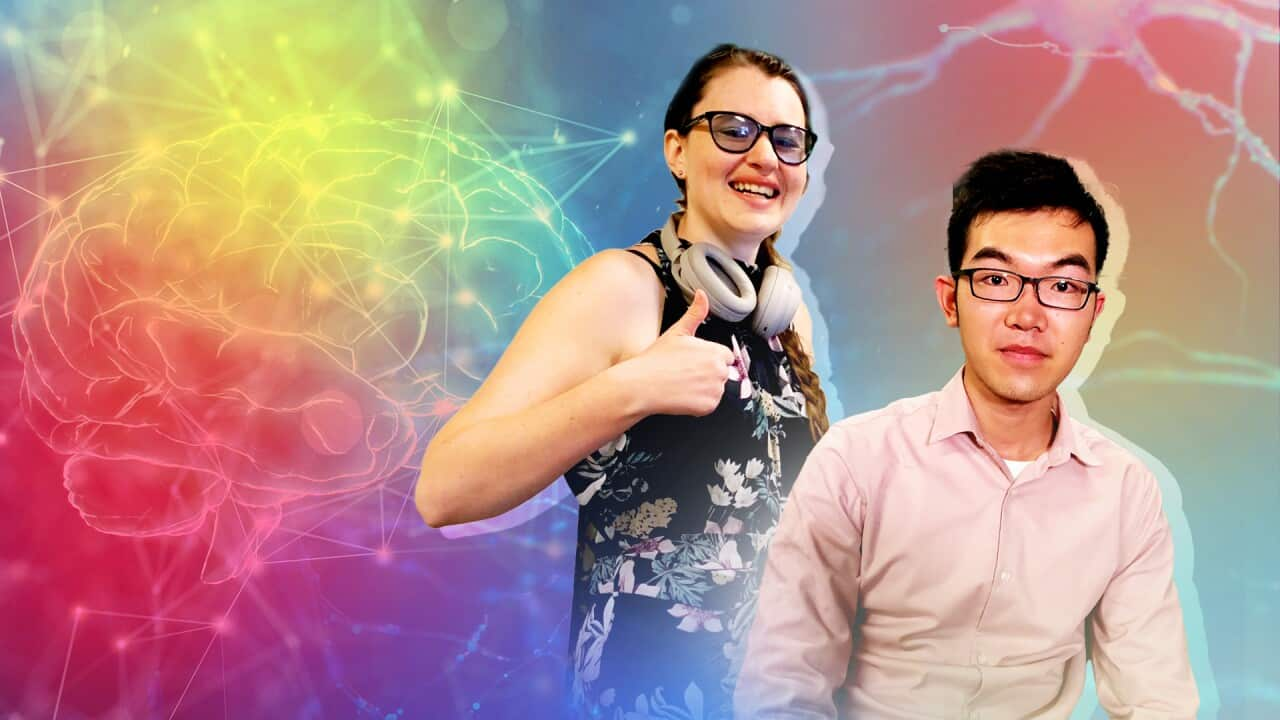Key Points
- A group of researchers are calling for the language used to describe autism and autistic people to be more empowering.
- The work provides a guide of terms to use, such as 'autistic person' instead of 'person with autism'.
A group of researchers are advocating for an update to the language used to describe autism in studies - and more broadly - so scientists can move away from discussing it as a problem, and instead as a neurological difference.
The team based at the University of Western Australia and tertiary institutes in New Zealand has developed a list of preferred terms for autism to reduce stigmatisation, marginalisation and exclusion of autistic people.
The practical guide, which was co-authored by an autistic academic and has been peer-reviewed, was released on Friday in the US-based journal .

Source: SBS News
"Language represents more than just words; it represents a shift in the way we view disabilities and neurodivergence," they said.
Language can be disempowering, dehumanising and degrading, Dr Monk said, and it's hoped the use of more inclusive terminology will better describe the condition and help improve understanding of it.
Autism Spectrum Australia (Aspect) is Australia’s largest autism-specific service provider and defines autism as "a condition that affects how a person thinks, feels, interacts with others, and experiences their environment".
"Every Autistic person is different to every other. This is why autism is described as a ‘spectrum’," it says, describing autism as "a different brilliant".
The Australian Bureau of Statistics estimated in 2015, 164,000 people in Australia were autistic and the unemployment rate for autistic workers was almost six times the rate of people without a disability.
Emma Gallagher is autistic and lives in Sydney. She is a believer in the philosophy "nothing about us without us".

Emma Gallagher thinks discussing language around autism is useful. Source: Supplied / Emma Gallagher
Ms Gallagher, who works with Aspect, which was not involved in the academic paper, thinks the work needs to be circulated widely.
"It can feel like to the community that autism has become a bit of a dirty word and people try to avoid saying it, so we like to take back ownership and ensure that the word autism is in that phrase on the autism spectrum because it is an important part of who we are," she said.
The language guide highlights using the phrase 'person with autism' - which some people think is more respectful - can in some cases be harmful as it's person-first rather than identity-first (autistic person), but Ms Gallagher said it's up to the individual as to how they personally identify.
"Generally within the community, identity-first language is overwhelmingly preferred, so research out of the US and this study out of Australia is overwhelmingly showing that the community prefers identity-first language," Ms Gallagher said.
Identity-first language emphasises autism as inseparable from the person and a critical part of their identity.
Ms Gallagher said young autistic people can form negative self-identities when certain language is used.
Autism does not need to be 'cured'
The guidelines in the paper also label cure, treatment and intervention as potentially offensive terms.
"Autism does not need to be cured or treated," Dr Monk said.
"While this paper focused on the language in autism research, we all felt that it was important that we emphasised that using the term ‘specific supports or services’ instead of ‘treatments’ was about more than just shifting our language use," they said.
Some of the other alternatives include replacing 'normal person' with 'allistic' or 'non-autistic' and referring to 'autism' rather than 'Autism spectrum disorder'.
"It must be accompanied by a shift in the actual practice itself, away from targeting autistic characteristics and towards supporting autistic people to live self-defined quality lives as their authentic selves," Dr Monk said.
Researcher Professor Andrew Whitehouse from Australia's Telethon Kids Institute also co-authored the paper.
"Using language to more accurately reflect what we know can actually help us to convey more nuance and more meaning in what we are saying," he said.
Professor Whitehouse said the terminology needs to catch up with the wider understanding about autism so it reflects what scientists know now.

Andrew Whitehouse says society's understanding of autism has changed. Source: Supplied
"Changing our language from language such as symptoms or cure to language such as behaviours or how we can support people, not just empowers those individuals but changes perceptions of the whole community," he said.
Professor Whitehouse said decades ago, an autism diagnosis was viewed as meaning the end of a fulfilling life but now knowledge has changed.
"Part of actually conveying all the amazing things and ways that we can support autistic children to become happy healthy adults is actually changing the way we talk about it," he said.
He has encouraged organisations, individuals and families to download the team's autism guide to proactively implement the relevant language.
Jacqui Borland is the chief executive of Aspect and said acceptance of autistic people has grown over time in Australia.
"I have seen the language around Autism change significantly over the past decade," she said.
Aspect has its own guidelines for how to talk about autism.
"We avoid all language that frames autism as a deficit, for example, 'disorder' or 'suffering from' autism," she said.
"And we capitalise the letter ‘A’ in autistic as an additional sign of respect for autistic individuals and the autistic community."
"But we also know that autistic people refer to themselves in a number of different ways and we really try to respect the individual’s preferred terminology."
*'Autistic person', rather than 'person with autism', has been used in this article at the request of the interviewees.
Would you like to share your story with SBS News? Email [email protected]




